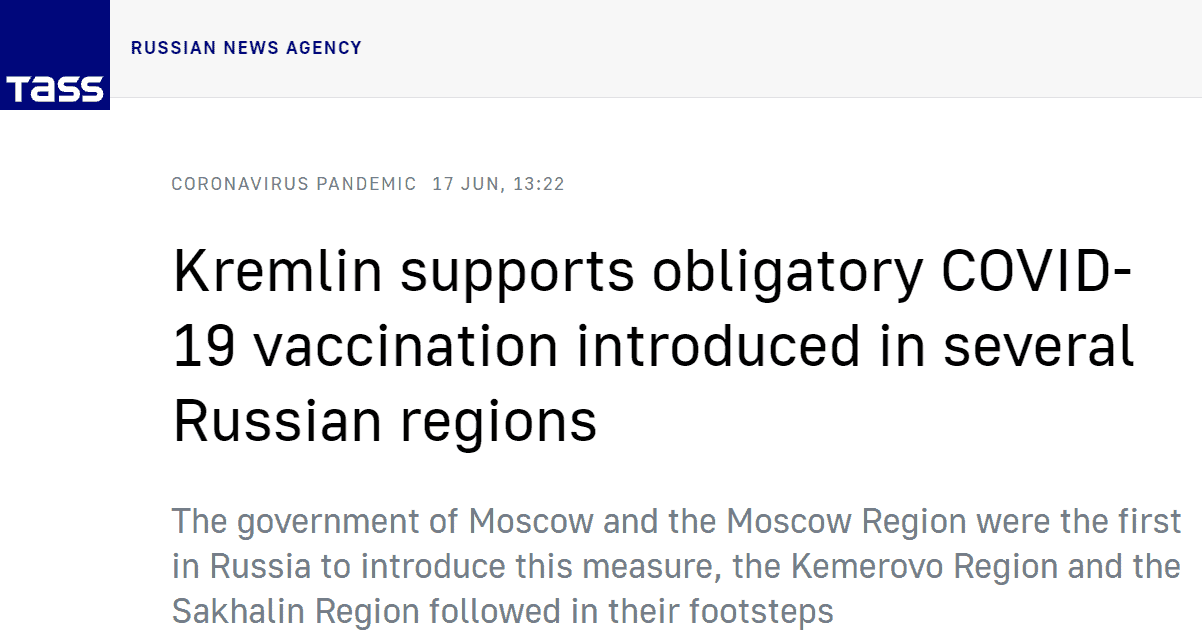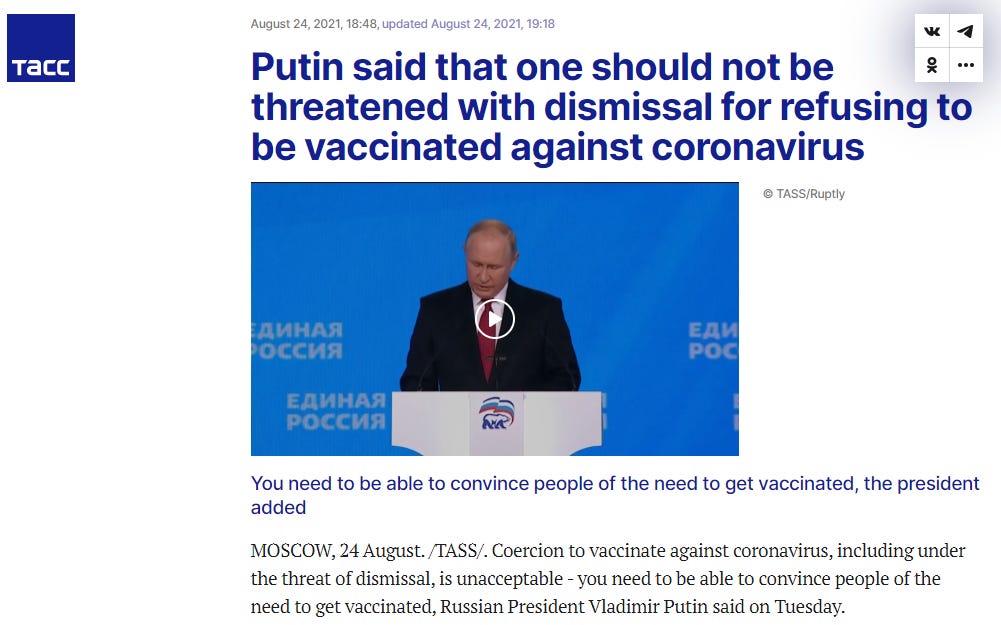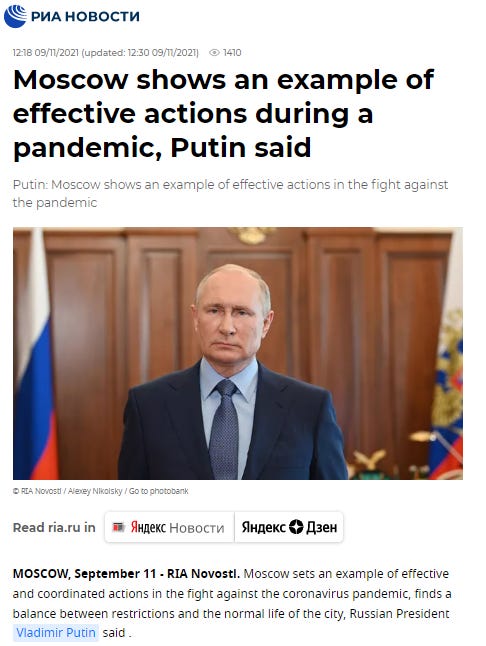Putin & compulsory vaccination
What is the Russian president's stance on coercive injections? It's complicated.
In Part I of this series we provided an overview of Vladimir Putin’s involvement in the development and deployment of Sputnik V.
This article will explore Putin’s views on mandatory vaccination.
“It is counterproductive and impossible to introduce mandatory vaccination”
Putin’s earliest position on mandatory vaccination was unambiguous: mass vaccination was necessary to end the pandemic, but, in his opinion, coercive measures should not be used.
“In my opinion, it is counterproductive and impossible to introduce mandatory vaccination,” Putin said on May 26, 2021. Russians should “realize the need” for vaccination and understand that without a vaccine they “might face a very serious and even deadly danger.”
Although he opposed coercive measures, Russia’s president stressed that “experts not only in our country, but all over the world” believed widespread vaccination was “the most correct and civilized way” to rein in the virus.
He revisited the topic a week later, reiterating his opposition to forceful measures—but also urging for more to be done to increase vaccination rates in the country.
“We are now ready to provide [a vaccine] to everyone who wants it. We will not force anyone,” Putin said on June 4. “The most important thing here is explaining the necessity, effectiveness, and safety. Apparently, we are not doing much about this.”
He attributed the lack of enthusiasm for Sputnik V to the “general mood of citizens,” noting not all Russians get flu shots.
Commenting on the immunization drives in other countries, Putin joked how some nations had resorted to offering “[free] beer” to lure people to vaccination centers.
“You can probably act in more civilized ways,” the Russian president quipped.
The Kremlin’s position became more nuanced in mid-June, when Russia’s capital and the Moscow region introduced compulsory vaccination for government employees and workers in certain business sectors.

Responding to the decrees, Kremlin spokesman Dmitry Peskov said on June 16 that “there is no mandatory vaccination” at the national level and “there is no talk” of introducing it.
A day later, Peskov said the coercive policies introduced in Moscow and the surrounding region were “absolutely a step in the right direction”—while adding this was his “personal opinion.”
"The principle of vaccination not being obligatory generally remains, but we are not very active in getting vaccinated,” Peskov explained. “So I consider such emergency measures absolutely necessary and justified.”

But this was only Peskov’s “personal opinion” as Kremlin spokesman. How did Putin feel about these new developments?
During a “direct line” event held on June 30, Russia’s president spoke with a Moscow resident whose wife was facing dismissal from work, even though she had a medical condition exempting her from the city’s compulsory vaccination decree.
“It's illegal. If there is a medical exemption, no one has the right to demand vaccination. I think that the director of the school where your spouse works does not know about this. I hope that he will hear this and these illegal demands will be dropped,” Putin said.
He also restated his opposition to mandatory vaccination.
Speaking on August 22, Putin described vaccination as “the best tool we have” to “overcome the pandemic”—but said it should not be imposed on the public.
The need for vaccination should be explained, Russia’s leader said, adding it was “necessary to create different kinds of incentives” to increase uptake.
Two days later, Putin expressed opposition to tying vaccination status to employment.

“The main weapon against the spread of the virus is vaccination, there is nothing new to say here. I will emphasize again: of course, no one needs to be forced [to get vaccinated], one must be able to convince people of the need to be vaccinated, persistently, respectfully … to explain how important it is to get vaccinated in order to preserve one’s own life and health, and protect one’s loved ones—to show this vaccine really works and reduces the risk of complications,” Putin told a United Russia conference on August 24.
But less than three weeks later, Putin suggested forced measures could be used in an effective and responsible way.
The Russian president praised Moscow—the first region to introduce compulsory vaccination and (short-lived) QR codes—for its “well-coordinated and effective” response to COVID.
Moscow Mayor Sergey Sobyanin found a “balance between the forced restrictions that are necessary to save the lives of thousands of people, and [preserving] normal life in a city of many millions,” Putin said on September 11, 2021.

According to Putin, Moscow’s “forced restrictions” were still preferable to the policies being rolled out in Europe.
“They have mandatory vaccination de-facto. This is what it is in reality. And look—in the UK, in many countries of continental Europe, this is how it is. We are doing it much more gently,” he said on September 26.
“The unvaccinated will live less comfortably than the vaccinated”
Putin’s finger-wagging at the EU was followed by a surprisingly blunt statement from Peskov about the inevitability of discrimination based on vaccination status.
“You know that the President has repeatedly said that vaccinations are voluntary, optional. But the specifics of the coronavirus situation, the specifics of the pandemic, one way or another will lead to the fact—I’m talking about all the countries of the world here—that the unvaccinated will live less comfortably than the vaccinated. This is the reality we are facing,” the presidential spokesman said on September 30.

In early October, Russia’s regions began adopting the same “well-coordinated and effective” measures first introduced in Moscow.
On October 7, Peskov claimed the Kremlin supported all measures aimed at boosting Russia’s vaccination rate.
“All measures are good. Any measures that can encourage more people to get vaccinated are good. And only vaccination saves from death,” the presidential spokesman told reporters.
By October 8, an estimated one-third of Russia’s regions had signaled their intention to require digital health passes to enter businesses and attend public events.

On October 14, Peskov berated unvaccinated Russians, claiming that their refusal to get the shot was irresponsible and “kills.”
As regions across Russia continued to implement vaccine decrees and QR codes, Putin clarified his position on mandatory injections.
“I have already said that vaccination becomes mandatory in our country if it is included in the national vaccination calendar, but vaccination against coronavirus infection is not included in the national calendar, so in this sense it is not mandatory,” Putin said on October 21, 2021.
At the same time, Russia’s president acknowledged that regional authorities had the right to introduce compulsory vaccination at the local level.
Whether regions were being pressured—or perhaps ordered—to adopt such policies is a question we will discuss in a separate article. What we do know is that the Kremlin was issuing “recommendations” that seemed to contradict Putin’s opposition to coercive measures.

On October 26, Putin issued a list of instructions to regional governors—including a “recommendation” to order unvaccinated citizens over the age of 60 to self-isolate.
TASS reported on the same day that every federal subject had adopted some form of compulsory vaccination.
By November, every region also boasted a QR code regime (although how the digital health passes were used varied from region to region).
If Putin was actively opposing these discriminatory policies, he had a strange way of showing it.
On November 8, Putin awarded Alexander Gintsburg, the father of Sputnik V, with the Order of Alexander Nevsky. The honor was bestowed upon the scientist in recognition of his “years-long dedicated work.”
In an interview published just a few hours before the awards ceremony, Gintsburg had endorsed the idea of limiting the movement and activities of unvaccinated Russians.

By mid-November, the federal government decided it was time to create a national digital health pass system. On November 12, Russia’s Cabinet of Ministers sent the State Duma two bills outlining a QR code system for use in public places and for long-distance travel.
But the proposal faced a major obstacle: Russians overwhelming opposed compulsory vaccination policies and the use of health passes.
On November 1, RIA Novosti invited Russians to vote on whether they were in favor of compulsory vaccination policies. 78% of the 190,000 respondents said they were against these unprecedented coercive medical interventions.
Pushback against the digital vax pass was even more fierce. A poll from November 14 found that out of nearly 1.5 million respondents, 92% opposed the introduction of QR codes and believed they violated the rights of citizens. The results of a November 25 survey on VK.com were remarkably similar. Of the 360,000 individuals who shared their opinion, only 20,000 voiced support for digital vaccine passes. 91% of respondents rejected the use of QR codes in public places.
Amid growing anger over coercive measures, Peskov reassured the public that the Kremlin would not support imposing fines on unvaccinated Russians.
But no such reassurances were given about the national QR code bill.
Putin stressed the importance of ensuring all aspects of the proposed national health pass system were worked out in detail, adding that regional governments should play a central role in finalizing the legislation.
“Before accepting, say, a restriction related to the use of public transportation, we must look very carefully at what this will lead to. And see if the transport systems are ready in order not to restrict the rights of people, while also ensuring the safety and health of the same citizens we care about so much," Putin said on December 9.
“I hope … we will find a solution that guarantees the rights of all citizens,” he added.
A day later, on December 10, Putin praised the progress being made on Russia’s homegrown international vaccine passport, “Travel without COVID-19”.
He noted that the smartphone app was already being used in Azerbaijan, Moldova, Tajikistan, and Uzbekistan.
In the weeks that followed, Putin continued to offer his input on the national QR code legislation.
“As for the law on the obligatory nature of certificates for visiting public places, shopping centers, cafes, restaurants, and cultural institutions, yesterday it was adopted in the State Duma in the first reading. Of course, this bill in its current version needs to be finalized,” Putin said on December 17. “The law, of course, must be precise, clear and understandable.”
He called on the government to “ensure that the certification system is fully technologically ready” so that it would “work reliably to protect the health of citizens.”
As TASS reported:
In speaking of the adoption of vaccination certificates, Putin noted that, contrary to expectations, he cannot announce that QR codes are unnecessary.
“I cannot end this on the note expected by certain social organizations and figures, taking into account both moral motivations and the duties of my office,” said the head of state, pointing to the continuing complications in the fight against coronavirus.
But Putin’s public endorsement of the national QR code system was not his last vaccine-related comment of the year.
On December 21, the Russian leader commended the Ministry of Defense for vaccinating nearly every person in the military.
“I would like to emphasize that the army has implemented all the necessary measures to combat the coronavirus infection in the army itself—it carried out almost 100% vaccination of personnel. This made it possible to avoid the mass spread of the disease, protect the life and health of military personnel and thereby guarantee high combat readiness of units and formations,” Putin said.
He made no mention of how this impressive feat was accomplished.
On June 18, 2021, the chief sanitary doctor of the Ministry of Defense ordered all military personnel to get vaccinated. The decree included conscripts as well as certain categories of federal civil servants.
The State Duma shelved the national QR code legislation on January 17, 2022, following a massive grassroots campaign to defeat it.
Responding to the decision to abandon the bill, Peskov insisted there was no need for a federally enforced QR code, since digital health passes were already being used at the regional level:
“There is no need for additional actions here, they will be carried out anyway,” he said, recalling that the regions have special powers that no one has canceled.
Russia’s regions began abandoning digital health passes in mid-February. The country was officially QR code-free on April 15.
Read Part III: Putin’s views on the WHO, Big Pharma, and the “international fight” against COVID
If you enjoy Edward Slavsquat, subscribe!






Great reporting, Edward! Very thorough documentation on Putin's and Russian government stand on the mandatory jabbing. One thing I'd add are couple of precursor events to the COVID story that began to unfold in January of 2020.
First: in early November of 2019 Putin started conversation about vaccination with his cabinet ministers and literally tried to force them to get a flu shot. This was very unusual, so I remembered this news item, thinking why would president be so insisting on it, since in the end this is a matter of individual preference?
https://translated.turbopages.org/proxy_u/ru-en.en.590d9152-62f81d04-0ba95fea-74722d776562/https/eadaily.com/ru/news/2019/11/11/putin-prizval-ministrov-ne-sovershat-samostrely-gripp-na-nosu
Second: in late November of 2019 Putin meets with Klaus Schwab in St. Petersburg where Schwab presents Putin with his book "The fourth industrial revolution". https://translated.turbopages.org/proxy_u/ru-en.en.7f00b590-62f819b5-93390a57-74722d776562/www.kremlin.ru/events/president/news/62145
These two facts while don't give us a "smoking gun" evidence of Putin's globalist pro mandatory vaccination, pro depopulation position, but they contribute to his overall psychological profile and show us where is his natural preference on these issues.
However, as I always say - in the political shell game one needs to watch the hands, not just listen to the words. If we look at the stats of 2021 Russia's excessive population loss was 1 million 42 thousand, that was the highest number for population reduction since the WWII. At the same time in US population loss was also on the rise but at about 50% of the Russian number for more than double the total number of people, which would make it 25% of Russian mortality on per capita basis. This type of humongous jump is not a fluke, more than anything it tells us that conditions created by the governments and the medical establishment in the country were conducive to this loss. How much of it can be blamed on mass vaccination against COVID, how much on denial or reduction of access to the medical services beside treating the novel flu, how much was the general stress of the population that felt betrayed and pressured by their own government we don't know for sure. But dead people is a hard evidence that is difficult to deny. When I raised that question about reasons for record population losses on Russian Telegram channels affiliated with the "official party line", my comments were invariably deleted and I received ban on some of the channels.
I hope this gives a bit of perspective not only on statements by various Russian officials, but on results of the policy that they were executing last 2.5 years.
Btw, as it appears the modern war is not as good a mechanism of getting rid of people as other means, like declared pandemic. But during war the primary victims are physically capable men that won't beget new children as a result. So there we have to multiply number of killed by the factor of at least 1.8.
A tactic which digital age governments have found very effective. Do a lot to make it seem like you are tightening things to the point of choking. Then, appear to retreat on the most extreme measures, while preserving the substance of what's been done. Once you got the public habituated to the new ways, in fact convinced that "it's always been this way," rinse and do it all over again,.... Take 5 steps forward, then one back, 5 steps forward,........ Thanks, Riley, seeing it develop over a period of 20 months or so one gets the sense of just how far we've been pushed, be it in Russia, or here where i am in California, or anywhere in this digital Covidian world.